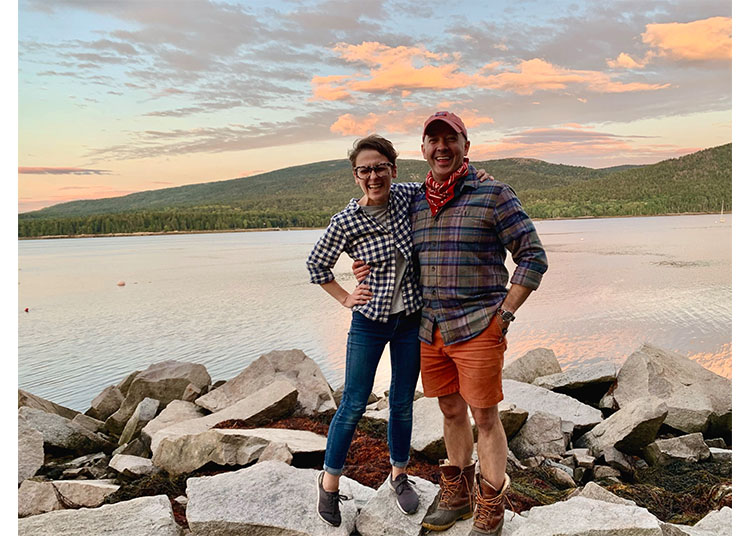From the Boardroom to the Workshop: How One Couple Navigated Maine’s Entrepreneurial Landscape

In the quaint New England town of Orono, Maine, the sounds of craftsmanship echo through the workshop of Shaw & Tenney, a business that has made a name for itself since 1858 as the leading manufacturer of wooden oars, paddles, spars, and boat hooks in the United States. Behind this success story are the entrepreneurs who have steered the family-owned business over the last 160 years. As the second oldest manufacturer of marine products in the United States, four families have guided the business, seamlessly blending tradition with innovation. The newest custodians are husband and wife team Neil and Jennifer Gutekunst.
The Gutekunsts acquired Shaw & Tenney from Steve and Nancy Holt, the third family to steward the company. Over their 20-year tenure, the Holts skillfully managed the transition to digital commerce, steering the growth of the business without compromising the quality and tradition of their products. Like their predecessors, Neil and Jennifer had successful careers in corporate America, which paved the way for their entrepreneurial path.

The Journey to Maine and Entrepreneurship Through Acquisition
The Gutekunsts journey into entrepreneurship began in 2019 when they decided to make a life-changing move from suburban Philadelphia to Maine. Captivated by the beauty of the state during vacations, Neil and Jennifer were determined to turn their dream of living in Maine into reality. To make their dream of relocating a reality, they searched business-for-sale listings online and found New England Treads on BizBuySell. This marked their foray into entrepreneurship through acquisition.
Neil, with a background in law and the Marine Corps, and Jennifer, an accomplished professional with expertise in manufacturing operations, technology, and organizational development, found their skill sets seamlessly transferring into business ownership. New England Treads, a business specializing in crafting custom stair treads and accessories, was their first acquisition. A year and a half later, they expanded their portfolio with the Wooden Screen Door Company. Like clockwork, a year and a half or so later, they revisited entrepreneurship through acquisition to purchase Shaw & Tenney.
Embarking on Entrepreneurship
Both Jennifer and Neil come from entrepreneurial families. Jen’s family owned a retail store for 25 years and Neil grew up working in his parent’s laundromats. When their business search led them to New England Treads, the couple felt a sense of kinship. The business they were looking to buy was similarly owned by a husband-and-wife team, and the husband, like Neil, had military experience.
Building a rapport with the seller, who was looking to retire from the business, was integral to Neil and Jennifer’s process, and the comfort and familiarity they built led to trust. The sellers, original owners who built the business from the ground up, expressed a genuine desire to see the Gutekunsts succeed.
The acquisition of Wooden Screen Door in November 2021 followed a familiar acquisition strategy. The owner’s readiness to retire presented an opportunity for Neil and Jen to invest in another Maine manufacturing business. As with their first acquisition, the seller remained available to guide them through the transition.
Lessons Learned Throughout The Buying Process
Throughout the process of buying businesses, Jennifer and Neil leveraged their corporate experience and built on their learnings along the way.
The Search
As their search for a business began, the Gutekunsts were excited about the prospect of buying an existing business, where they could bring a fresh and modern perspective to a hidden gem. Remaining open to various industries during their search, the one constant was their belief in the advantages of buying an existing business. The immediate cash flow from day one not only allowed them to hit the ground running, but also made financing the acquisition easier. While Neil and Jennifer were willing to take risks with their first acquisition, they gained valuable insights into the process, which was invaluable in subsequent acquisitions.
Assembling a Team
During their search for business opportunities, Neil and Jennifer decided not to use a buy-side business broker. Building relationships with sellers, rooted in trust and shared values, became essential for a smooth transition. Alongside working closely with sellers during the acquisition process, they assembled a team of experts, including bankers and attorneys, to guide them along the way. Leveraging the Small Business Administration (SBA), they secured financing from a small, local community bank familiar with business. The team assembled for their first acquisition were at their side when they bought the next two.
The Process of Buying a Business
Along each step in the process of buying a business, Jennifer and Neil had valuable insights. Meticulously reviewing business-for-sale listings, identifying opportunities listed by brokers and owners going the FSBO route, and analyzing financial data were key aspects of their approach. During site visits, their attention to detail extended to spotting corded phones, signaling an opportunity to modernize a beloved local business.
For making offers and negotiating sale terms, they leaned on books about entrepreneurship through acquisition and BizBuySell’s Learning Center. With their first acquisition, they made an offer close to the asking price, and negotiated a first right of refusal to own the real estate associated with the business. This important negotiation tactic proved useful in subsequent transactions, as they now own all the real estate associated with their businesses. And while each sale differed, the process remained consistent.
During the due diligence phase, the Gutekunsts looked for smooth processes, engaged employees, and a clear roadmap for success. Pouring over the financial data was equally important as understanding the operating procedures. Given their focus on manufacturing businesses with unique craftspeople, handing employee transitions was most important. Ensuring fair pay and benefits, agreed upon before closing, and navigating the transition phase with careful attention to employee engagement were integral components.
Transition to Ownership: Extreme Ownership and Holistic Management
A defining principle for the Gutekunsts is "extreme ownership"—a philosophy that advocates taking responsibility from the top down. Everything at the business falls back onto the owners, empowering team members to make mistakes and learn in a safe and trusted environment. Jennifer, drawing on her experience as an HR executive, emphasizes the importance of emotional intelligence and creating a positive workplace culture. Their hiring strategy prioritizes emotional intelligence over skills, fostering a culture where employees feel empowered to run the business. The couple believes in working on the business, not in it, nurturing a team that can execute their vision.
Navigating the Business Landscape
Navigating the business landscape involves more than just acquiring companies; it requires a strategic approach to management. The Gutekunsts stress the importance of assembling a team of experts, including a local bank, lawyer, insurance provider, and accountant. They foresee opportunities in Maine as older generations of manufacturing business owners retire, leaving successful businesses available for purchase.
When Neil and Jennifer embarked on the world of entrepreneurship, they were open to possibilities, in pursuit of their dream to call Maine home. Their strategic decision making led them to start their entrepreneurial journey by buying an existing business.
Now, as proud business owners, and a part of Maine's bustling business community, Neil and Jennifer see the silver lining in the state's aging population. They believe there are great opportunities available for those looking to enter into the world of entrepreneurship, to become stewards of the businesses built in Maine.

